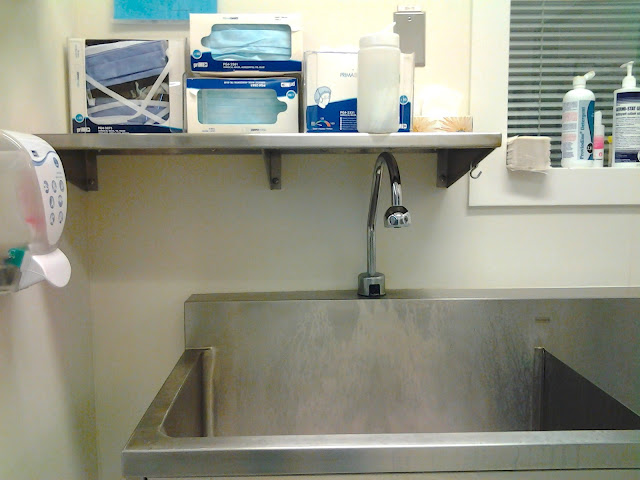Gyne oncologists (in this city, at least) don't see any obstetrics or general gynecology cases. From my (perhaps naive) perspective that's pretty great -- they get to avoid the stress and urgency of delivering babies and the frustrations of managing non-specific pelvic symptoms. That's not to say they have it easy -- gyne oncologists do some of the toughest gyne surgeries out there. More than a few times this past month, mid-laparotomy, staring into an abdomen full of inflammation, adhesions, and fragile previously irradiated tissue, I've found myself doubting that the surgeon would be able to resect a massive ovarian cyst or bowel-adherent uterine cancer. But every time they've gotten it out. It takes a combination of skill, guts, and perseverance to get through these challenging cases, and I've certainly gained huge respect for these gyne oncologists.
Here's what a typical gyne oncology day looks like for me:
0530 h: I drive to the hospital, search around a bit in the residential streets for a parking spot, run up to the OR to change into scrubs, and head down to the ward to print a patient list.
 |
| I can tell how late I am by how far away I have to park. But not so late that the moon and a planet aren't still visible... |
0700 h: The staff gyne onc arrives and we run through the list, then round again as a team, usually accompanied by the nurse practitioner, pharmacist, and dietician.
0730 h: Once a week we have new patient rounds, where cases are discussed over videoconference with the gyne and radiation oncologists, radiologist, and pathologist present, to come to a consensus on management.
0800 h: Usually by 8 am the OR is paging us to come up for the first case. Generally two residents assist the gyne oncologist. I usually end up as the "bottom end" resident, which entails holding the uterine manipulator and pushing it up/down/left/right to "drive" the uterus as the surgeon requests.
I've seen a good mix of open, laparoscopic, and robotic procedures; mostly ovarian cystectomies and hyst BSOs. The surgical robot, which I'd previously seen on urology, is neat technology -- the surgeon controls the robot's laparoscopic arms with pretty impressive dexterity from a 3-D viewing console in the corner of the OR. The residents assisting also get to sit down during robot cases, which is the best thing ever.
 |
| questionable sterile technique (in an actual case the robot would be covered in disposable plastic -- but that's not very sexy) (http://www.arabiangazette.com/da-vinci-robotic-surgery-popular/) |
Throughout the day we check back in on the ward, following up on bloodwork, investigations, and consults we'd ordered during rounds.
 |
| lots of walking up and down this (previously-featured-because-it-is-awesome) stairwell between the ward and OR |
And that's the day! I usually list some study resources at the end of these day-in-the-life posts, but waking up at 4:15 am and falling asleep pretty much the moment I finish dinner really hasn't left me too motivated to read these days. I'm embarrassed to admit that all I've done has been to browse the AHS Cancer Guidelines and skim-read my Hansen Evidence-Based Radiation Oncology book. I'll definitely have to dedicate more time to studying when I'm on gyne rad onc...and don't have 6 am rounds :)





hehehe, this is pretty much how part of my OB surgery days went! I feel ya on the almost-passing-out bit. The first time I witnessed a c-section, everything was suddenly super super sparkly. (Thankfully, I sat down before I actually keeled over, haha. ._.)
ReplyDeleteGood save :) It's such a bizarre feeling!! Unlike me you were smart enough to sit down!
Delete